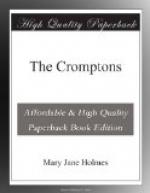“I never for a moment thought her dishonest,” the girl exclaimed, vehemently. “I remember her as some one seen in a dream—a frail little body, with a sweet face which seldom smiled. There were other faces round us—dusky ones—negroes, weren’t they?”
Her eyes compelled the Colonel to bow assent, and she continued, “I thought so, and our home was South; not a grand home like this, but a cabin, I think. Wasn’t it a cabin?”
Again the Colonel bowed, and Dora went on, “There came a day when it was full of people, and somebody was in a box, and I sat in Shaky’s lap. I have never forgotten him. He was all the father I knew.”
The Colonel drew a long breath, and she went on, “He held me up, and bade me kiss the white face in the box. That was my mother?”
Again her eyes made the Colonel bow assent, and she continued, “After that there is a blank, with misty recollections of another box on the table, and a walk across hot sands with Shaky, and then I came here, where you have tried hard to blot all the past from my memory, as if it were something of which to be ashamed. But I shall find my mother’s family some day, and Shaky, if he is living, and shall know all about it. There was a girl, too—Mandy Ann. I called the doll you gave me for her. She took care of me when Shaky didn’t. He is more distinct. He took you to the graves the day you came for me, and I went with you and showed you my play-house under the palm tree—the poor little thing, but dearer to me than the best you have ever given me, because it was hedged round with love, even if it were the love of negroes. Things are coming back to me now so vividly, pressing on my brain which feels as if it would burst, and I remember the blacks, and their prayer meetings, and the songs they sang, and their hallelujahs and amens sound in my ears, and I think they always have, and helped me on and up when I have been practising difficult music. When a child at school I was often taunted and mocked for what the children called my negro brogue and talk. We had several battles in which I generally beat, although I was one against a dozen. There is a good deal of fight in me which I must have inherited from my father, who, I suppose, was a Southerner, if you are not he.”
The Colonel only glared at her, and she continued, “I have been told, too, that there is a negro twang in my voice, and I am glad of it, and try to imitate the sounds which come to me from a past I so dimly remember, and which I think are echoes from some negro prar meeting. You see I have not forgotten the dialect of my early surroundings, and some day—I tell you again, I shall find the place and the graves of my people, and know what you have kept from me so carefully.”
“Better not. You’ll be sorry if you do. Your mother’s family were Crackers,” the Colonel said. “You would not be proud of the connection, although they were respectable people.”




